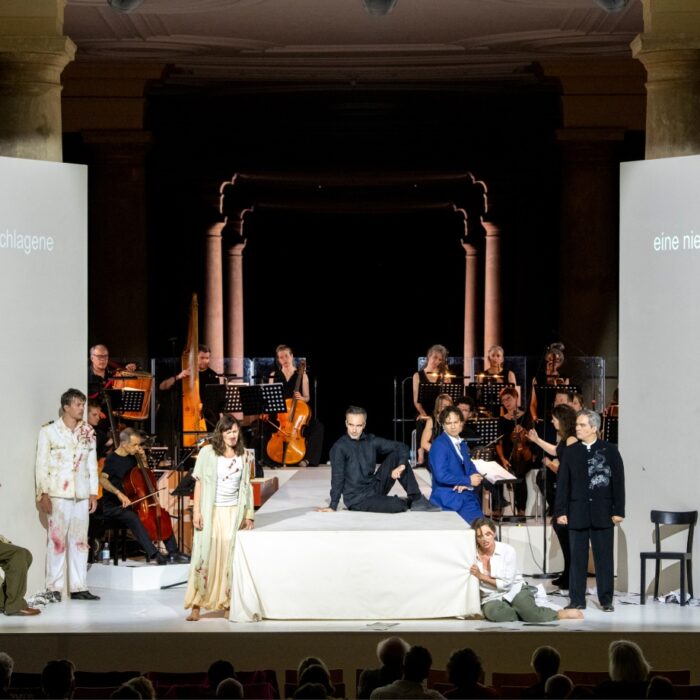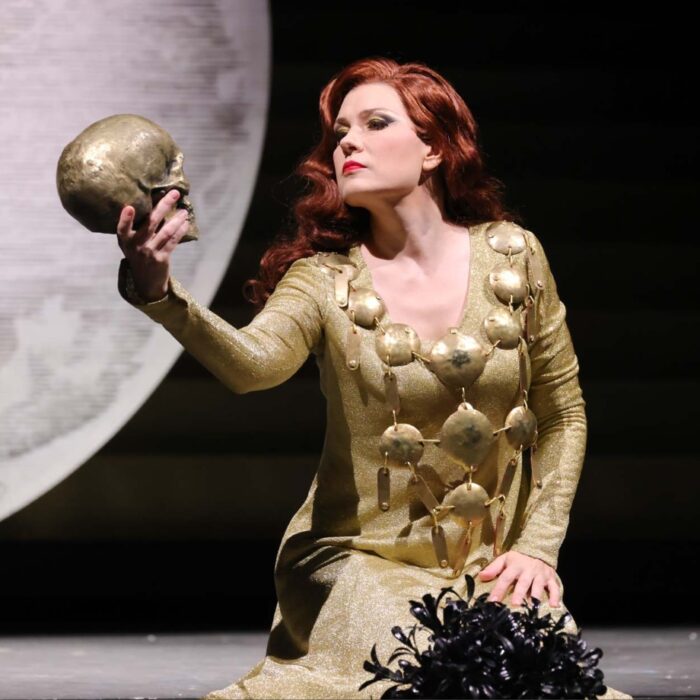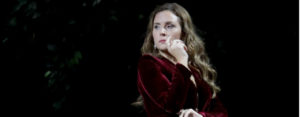
Teatro alla Scala 2021-22 Review: Fedora
Sonya Yoncheva & Roberto Alagna are Devastatingly Brilliant in New Production by Mario Martone
By Francisco Salazar(Credit: Teatro alla Scala / Brescia – Amisano)
On Oct. 18, the Teatro alla Scala held the second performance of Giordano’s “Fedora.”
The work first premiered in 1898 and has a history with the theater with Maria Callas and Mirella Freni among the most renowned performers of the work. It has also been a vehicle for Franco Corelli, Plácido Domingo, and José Carreras at the theater.
The opera was last performed in 2004 with Maria Guleghina in the title role. Now years 18 years later Sonya Yoncheva is making her role debut alongside Roberto Alagna, who is returning to the theater for the first time since 2006. Mario Martone directed a modern take inspired by cinema and by the famed painting “The Menaced Assassin.” The result was an exhilarating evening filled with great singing.
Modernity
Mario Martone’s production is a modern take. But it is indistinguishable where it is set.
The opening act is in a New York-style penthouse that has a living room space with a television showing a soccer game and a bedroom behind curtains. The second act was a French villa/chalet. There was a central staircase that had two floors, one where the chorus congregated in the first half and one downstairs which was surrounded by a garden. The third act was the most intricate. The first image was a sleigh that came out of the curtain to set the scene of snow. This element didn’t quite work because it seemed like an extraneous plot device conveniently placed to distract from the interlude that was being performed.
The third act eventually opened on a tableau of a mountain scape with a bare set. In the middle of the act, a set was pushed out that was a recreation of René Magritte’s “The Menaced Assassin.” During this scene, numerous “assassins” started coming to the sides and three in the far back of the stage to recreate the painting. However, unlike the painting, which shows different points of view of each assassin allowing audiences to analyze every moment in the painting, Martone never quite created the same effect. I questioned why these assassins kept walking in and out and what their real purpose was, particularly in a moment like Fedora and Loris’ emotional duet. Still it was interesting.
The final scene is performed under a cross on a bed. The stage is completely black and all you see are Fedora and Loris. It is a powerful image to end on.
All in all the production works on a basic level as it moves the story forward. However, it does obfuscate the storytelling in moments when Martone aims to show too much. During “Mia madre, la mia vecchia madre,” a woman walks on representing his mother followed by a woman and a man representing his wife Wanda and Her lover Vladimiro. The characters were covered with white masks. It detracted from Robert Alagna’s performance, especially considering that the tenor is undeniably a dominant artist who can easily narrate the text without the need or support from extraneous images.
The costumes by Ursula Patzak were attractive and modern. Yoncheva’s burgundy gown in Act two was striking while Serena Gamberoni’s Act three green gown fit the flirtatious character to perfection.
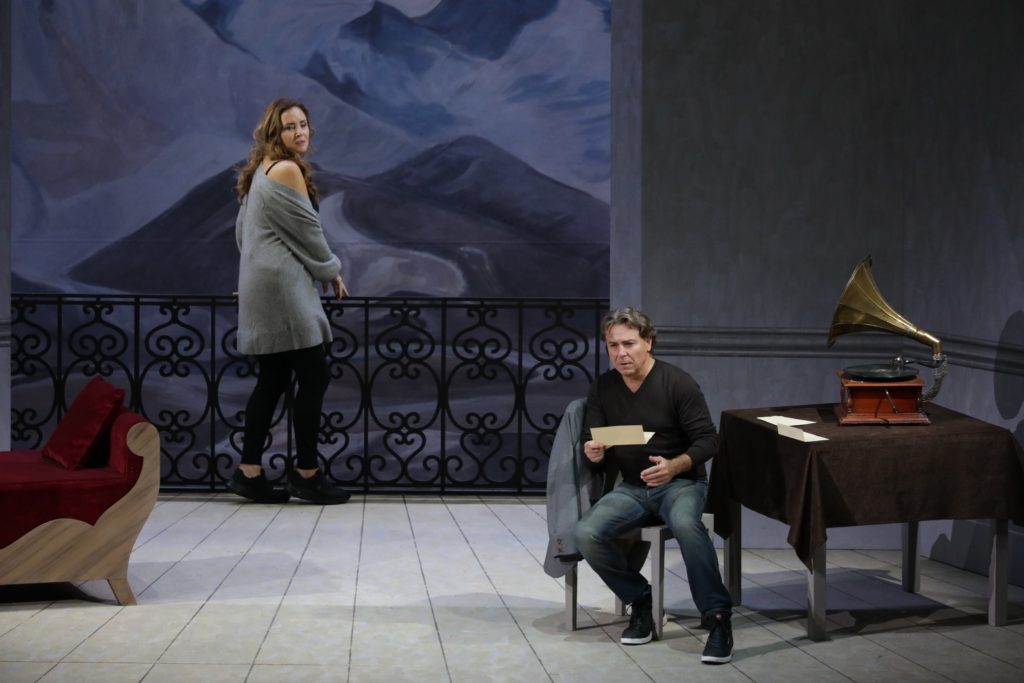
Ph. Teatro alla Scala / Brescia – Amisano
Masterful Conductor
In the pit, Marco Armiliato conducted what in my opinion is among his best work in years. Armiliato’s job is quite complex as Giordano’s orchestra shifts from bouncy waltzes in Act two to intense drama throughout. There are some modern touches in his writing, like the piano in the first Act two duet and then there are some utterly gorgeous passages like the orchestral interlude in Act two which gave Armiliato the chance to explore a diverse array of shades. One could hear heavenly lines featuring the harp and then there were some moments where the dramatic power of the score took over in this interlude. Armiliato’s conducting at this moment was just sublime.
But then there were other moments where the orchestra was also present such as the lower strings in the Sireiux’s monologue and the violin solo that oozed with nostalgia during Loris’ letter reading. The finale was also dramatic as Armiliato crescendoed in the brass section and slowly diminuendoed to a divine violin chord that eventually tremoloed into the final forte chord. In the hands of Armiliato, we were led through a series of emotions and it is exactly what the opera requires.
The Diva
In the title role of Fedora, Sonya Yoncheva was making an auspicious role debut in what I consider some of her best singing in years and in what will likely become one of her best roles. Yoncheva may not be completely comfortable with certain parts of the role but she will grow into the part as she continues to perform it as she did during this evening.
The soprano opened the first Act a bit slow with the voice a little grainy and the low notes lacking resonance. But when she opened her first aria “O grandi occhi lucenti,” the voice warmed up with a gentle tone that emphasized the velvety quality of her voice and her famed legato line. The second aria “Su questa santa croce” was sung with a lighter texture emphasizing the peaceful prayer. The tone never went above a mezzo piano and it was gorgeous how her voice melted into the music.
While Fedora doesn’t really have very high notes, the opera is complex as it requires the soprano to do a lot of Parlato singing, and therefore many of the opera requires the singer to emote and phrase that spoken text. Sometimes Yoncheva struggled to differentiate some of the phrases in Act one and Act two. But her diction was so clear that you could understand what she was trying to express.
Where Yoncheva was most effective was in the many vocal outbreaks and parola scenicas that Fedora has. Here Yoncheva was giving it her all bringing the power of her voice to the fore. And in the Act two duet with Alagna, “Vedi, io piango,” Yoncheva let out all the emotions for the first time singing with great power, and the high notes bloomed. She was magnetic as she hesitated to accept her Loris’ affections. But when she finally sings the lines “T’amo,” it was jubilant and compelling.
The final act of the opera saw Yoncheva in her element. Her opening lines gleamed with happiness but quickly turned to torment as she heard George Petean’s monologue. Her facial expression displayed fear in every way.
And then in her brief aria, “Dio di giustizia,” Yoncheva sang with a beautiful soft timbre. It was heartbreaking. When it came to the duet with Alagna, Yoncheva brought her intense tone (it can sometimes sound grainy with a slight wobble) and sang with abandon. One could feel the character’s remorse for the death of Loris’ mother and brother and even if sometimes her low tones were guttural and lacked resonance, you couldn’t help but be moved by Yoncheva’s commitment to the music. And then in her final lines “Troppo Tardi! Tutto Tramonta,” Yoncheva’s legato lines were ethereal. Even her chest voice was suddenly full and absolutely stunning. It was some of the best-sung lines of the evening and they were devastating.
Some Words on Humiliating Artists in Public
It was particularly disappointing to hear that after such a glorious showcase, some members of the audience opted to boo the soprano. I bring this up because it is the second time this week that I have had to make mention of a soprano being booed by the audience (the other being Liudmyla Monastyrska in “Forza del Destino“). Of course audiences don’t have to like an artist’s performance and many might take issue with some of Yoncheva’s choices (I didn’t), but to boo her at any point in the performance is to attempt to publicly humiliate her or any artist at their place of work, especially under the protection of darkness and anonymity that being an audience member gets. I doubt these people would do it to the singers’ faces. The “heckler” who verbally attacked Brenda Rae at the Met might never be allowed to return to the NYC opera house, but he also got away with having his identity kept anonymous, never having to worry about any Google search automatically linking his name to his reprehensible behavior.
Freedom of expression is important, but it shouldn’t be irresponsible or degrading to others. And there’s a place and time for that. You have choices if you dislike something. You can walk out or not applaud. Hell, you can go on social media after and complain to your heart’s content. Or create a blog / website / newsite and do it there. But I am convinced that those who boo want it to be about themselves, to make sure that others around them KNOW their opinion and help them in promoting it, all without having to be held accountable.
Think about the other possibilities. If you don’t applaud, no one will see or hear your disapproval. But you are still expressing it. If you walk out, people will see it briefly, but not knowing why, they might just think you needed to rush to the bathroom or head out. Or they might surmise that you didn’t like what you saw / heard and had enough. And finally, going on social media… that requires having an actual following that cares to listen. Not everyone enjoys that. And if by chance someone sees what you wrote and disagrees, you might have to deal with the discomfort of being confronted and questioned on your opinion and actually have to engage in a conversation on the topic.
So booing seems like a solid alternative right? No one can see you. No one will hold you accountable later. But everyone can hear you. And they know for a fact what your opinion is. And if they happen to share your opinion, you have encouraged them to do much the same.
And what can the artist do when they are literally being harassed after hours of work? You could do what Yoncheva did and ignore it or you could fight back like Irene Theorin did a few months back, but that shouldn’t be necessary. These are people who, despite what one might opine on their work, have bared their soul for the last few hours for the audience’s benefit and enjoyment. Verbally assaulting them doesn’t benefit anyone except the person doing the booing and letting them “express themselves.”
One might say… but it’s Italy. It’s traditional to do this at La Scala or Parma. Sure. It was also traditional to pay people to walk into the stalls and boo people for money (who knows, maybe that was what happened on this evening, which somehow makes it worse). The world is full of traditions, many of which aren’t great or should not persist. Booing is one of them. It is an act of selfish cowardice.
The Great Tenor
Anyways, back to “Fedora” and someone who knows La Scala’s penchant for disrespect quite well. “Fedora” marks Roberto Alagna’s return to the Teatro alla Scala after that much-publicized walkout in 2006, and he made the most of his return with a legendary showing.
The tenor role of Loris Ipanoff is a complicated one as Giordano basically asks the singer to open with the work’s most famous aria “Amor ti Vieta.” Alagna opened the aria with an incandescent tone filled with passion and signaling to audiences that he was ready to put all his emotions into this role. In the first of two duets in the second act, “Se innocente sei davvero,” you could hear Alagna relishing in each phrase as he declared his love for Fedora and he sang the spoken text with power and impeccable diction. But Alagna’s tone became uneasy as Yoncheva’s Fedora continued to be suspicious of him and the murder of Vladimiro.
In the second act, Alagna developed his emotional weight in “Mia madre, la mia vecchia madre” showcasing his Loris’ torment. It was a virtuoso performance as Alagna narrated the betrayal of his wife with Vladimiro. And when Alagna finally revealed he was the murderer of Vladimiro, his tone grew in intensity and passion, the high tessitura blooming with power. During “Vedi, Io Piango” you could hear Alagna bring out the tortured spirit of Loris and as Yoncheva’s Fedora eventually gives into his love, Alagna’s timbre gained a brightness as he sang “Fedora io t’amo. Il tuo sguardo m’inebria.”
The final act, which is essentially an extended duet, saw Alagna go from torment in his letter reading to outbursts of rage as he questioned Yoncheva’s Fedora about who his mother and brother’s murderer were. And during the lines” Sei tu che uccidesti mia madre e il fratello!” Alagna’s voice was full of furious power.
As Yoncheva’s Fedora died, Alagna kneeled and lamented, his “non voglio che muioa!” and “per darti il mio perdon” full of repentance. It was so evocative that it was hard not to tear up.
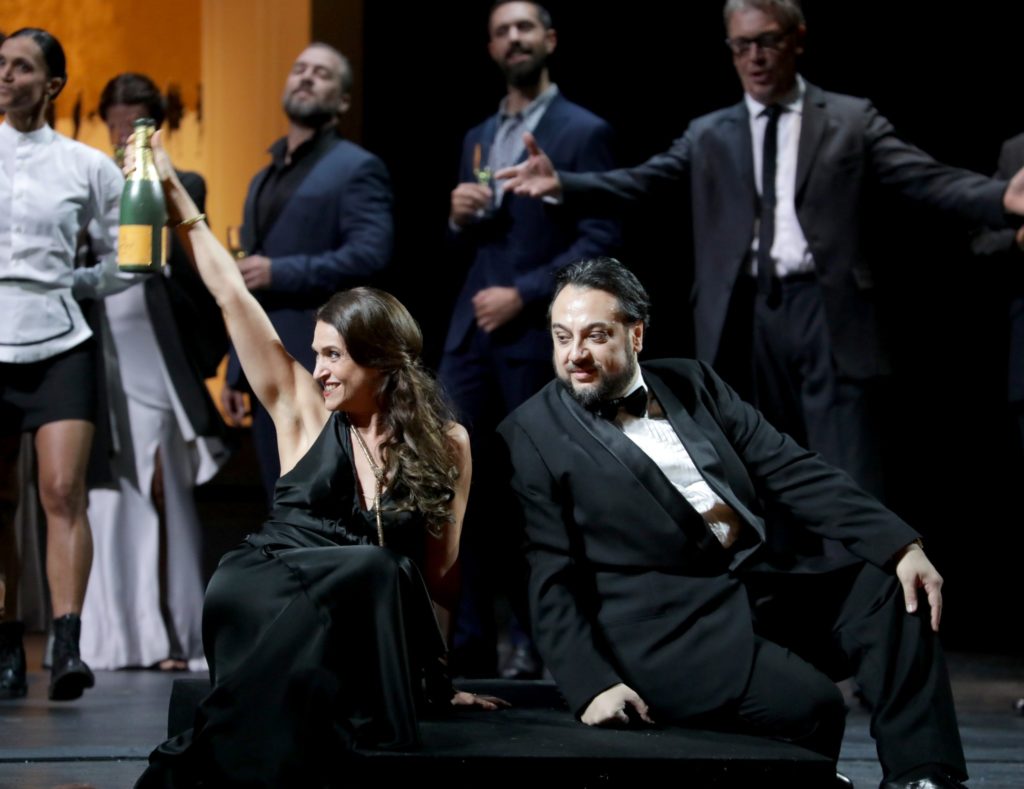
Ph. Teatro alla Scala / Brescia – Amisano
A Countess & Siriex
In the role of La Contessa Olga, Serena Gamberoni was stunning in every way. Vocally she showed a bright coloratura voice that was youthful in every way. Her aria “Il Parigiano e come il vino” was sung with flirtatious allure filled with patter-like lines and coquettish ritardandos. But her virtuosity wasn’t only in her voice. It was astonishing how in Act two she twirled while singing perfect high notes and danced around the set. And then in Act three she rode a bike while singing. There were moments where I felt she could fall into the pit but the fact that she was able to sing and rode a bike only expressed how committed an actress she is.
George Petean sang the role of De Siriex with astonishing versatility. In Act two, his “La Donna Russa,” which could sound a little like a bacchanal, was sung with a sarcastic tone that showed the booming baritone’s power. Then in Act three in his monologue “Lui?…cade per l’empia di crudelta,” there was an ominous shade in his lower voice that matched well with the lower strings.
Andrea Pellegrini sang the role of Cirillo with a virile sound that resonated with warmth and pain while Carlo Bosi sang Il Barone Rouvel with a light and flexible comic tenor. Caterina Piva and Cecilia Menegatti were also notable in the roles of Dimitri and Un piccolo Savoiardo.
There are still a number of performances left of this “Fedora,” a must-see showcase at the Teatro alla Scala.
